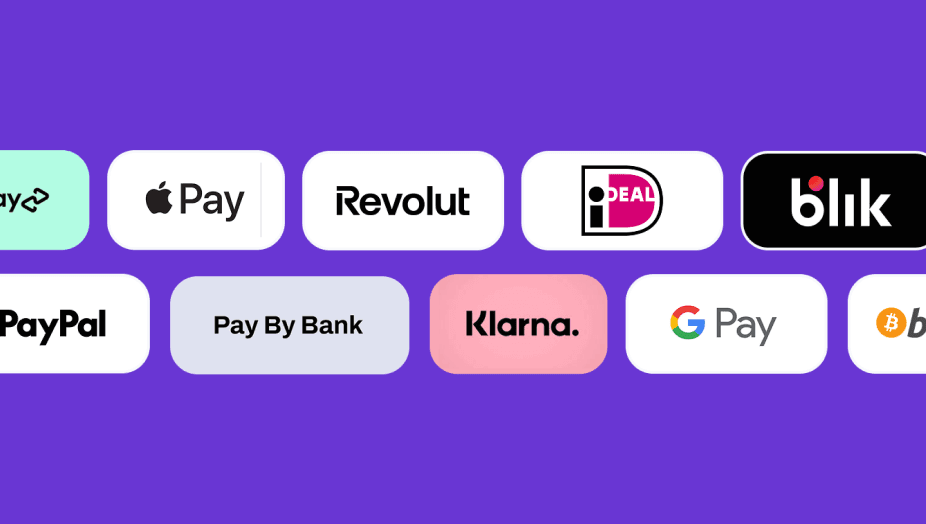
Europe’s payment scene is moving fast and getting more complex. The market itself is growing quickly. According to Grand View Research, the European payment processors market was worth around $7.78 billion in 2023 and could reach $31 billion by 2030, with yearly growth of about 22 per cent. Europe now makes up around 24 per cent of global payment gateway revenue.
With more cross-border shopping, Open Banking becoming more popular, and customers still expecting familiar local payment methods, choosing the right payment gateway can have a big impact on your growth. In this guide, we’ll walk you through what to look for, what’s changing, how the best European payment gateway providers compare, and why more European merchants are choosing Noda for faster, simpler, and much cheaper bank payments.
What European Customers Expect from a Payment Gateway
European shoppers know what they like, especially when it comes to paying online. And it’s not always cards. In fact, many people prefer local payment methods they already trust, like iDEAL in the Netherlands, BLIK in Poland, or Bancontact in Belgium. So if you're offering subscriptions in France or next-day delivery in Poland, you’ll need to make sure your payment setup fits the local habits. What works for a single-country store won’t always work for a marketplace selling across 10 different regions.
And there’s more change coming. As of January 2025, SEPA Instant payments are mandatory across the EU. Meanwhile, card usage is expected to drop to just 33% of ecommerce payments by 2026. That means Open Banking is gaining traction as more merchants understand its many benefits.
| Want to stay ahead of the curve? Noda lets you accept instant payments and pay-by-bank options across Europe with no hidden fees, and processing costs starting from just 0.01%. Try Noda → |
Open Banking Payments in Europe: Adoption and Trends
Open banking has been growing rapidly across Europe since PSD2 came into force in 2018. In the UK alone, open banking payments surged from 25.2 million in 2021 to 68.2 million in 2022, according to the recent Open Banking Limited report. By 2024, UK transactions had risen dramatically, reaching a total of 223.9 million for the year. As of March 2025, there were 13.3 million active open banking users in the UK—a 40% increase compared to the previous year. Impressively, 1 in 13 Faster Payments during that month was an open banking payment, amounting to roughly 31 million transactions.
Across Europe, countries like Germany, France, and Italy now collectively process over 6.4 billion open banking API calls annually. Globally, the value of open banking payments is forecasted to reach $116 billion by 2026, highlighting continued momentum and adoption of open banking worldwide.
So, what’s behind the shift?
- E-commerce is booming
- Card payments still fail up to 14% of the time
- Card-not-present fraud is responsible for 78% of UK payment fraud
- Mobile banking is everywhere, so customers trust their bank apps
Add to that: better UX, hosted payment pages, and Variable Recurring Payments in countries like the UK. It’s now easy to integrate, and customers are responding. In fact, nearly 20% of UK consumers now use Open Banking, up from 6% in 2021.
Noda makes it easy to tap into this growing trend. You can start accepting Open Banking payments in under 24 hours — and keep more of what you earn with fees as low as 0.01%. |
Top Payment Gateways in Europe
To help you decide, we’ve looked at six popular providers used by merchants across Europe in 2025, from global giants like Stripe and PayPal to Open Banking-first options like Noda. Each one has its strengths, limitations, and sweet spots.
1. Noda
If you're ready to tap into the full potential of Open Banking, Noda gives you a fast, affordable way to do it, with no hidden fees and no long waits for your money.
At its core, Noda is a bank-first payment gateway, letting customers pay you directly from their bank account in seconds. It’s perfect for businesses that want to skip card networks altogether while still offering a smooth, secure checkout experience. And if you want extra flexibility, Noda also supports QR codes and pay-by-link options for in-person or remote payments, ideal for events, consultations, and local services.
Why it works:
- Transaction fees from only 0.1%
- Real-time settlement — payments land in your account instantly
- No chargebacks and no PCI burden thanks to direct bank-to-bank transactions
- Connects with over 2000 banks in 28 countries
- Easy to integrate via API or plugins
- Friendly, responsive support team and personal account manager
2. Stripe
Although an American company, Stripe has a strong offer, which makes it very popular in Europe. Stripe is a favourite among developers for its API-led setup, clear interface, and solid documentation. It handles over 135 currencies and supports nearly every major payment method used across Europe.
Pricing:
- 1.5% + £0.20 for UK cards
- 2.5% + £0.20 for EU cards
- 3.25% ++ 20p + 2% FX for international
What we like:
- APIs with custom metadata, SCA exemption logic
- Stripe Connect for marketplaces
- Built-in fraud tools (Radar), billing, and invoicing
Watch out for:
- Cross-border and FX fees add up fast
- Stripe has been known to freeze accounts if it detects risk
3. Adyen
Netherlands-based Adyen is not just an euro payment gateway; it’s also an acquirer in most European countries. That means fewer intermediaries, better conversion rates, and more consistent fraud screening.
Pricing:
- IC++ model with ~0.6% markup + €0.11
- APMs (like iDEAL, Klarna) are charged per use
- No monthly fees, but minimum turnover requirements apply
What we like:
- Local acquiring improves acceptance
- Unified commerce for online + POS
- RevenueProtect for fraud control
- Full support for split payments and recurring flows
Limitations:
- Manual onboarding with compliance vetting
- Complex setup, best for teams with tech support
- Not small-business-friendly
4. PayPal (via Braintree)
PayPal is originally a US solution, but extremely popular globally and in many European markets. It is often the default choice in markets like Germany, where brand recognition drives conversions. You can go basic (PayPal Checkout) or integrate via Braintree for card acceptance, vaulting, and advanced options.
Pricing:
- PayPal Wallet: 2.9% + £0.30 (UK)
- Braintree: 1.9% + £0.20 (UK cards)
- Cross-border fee: 1.29%
- FX markup: ~3%
Pros:
- No developer needed
- Trusted badge = higher conversion
- BNPL with PayPal Pay in 3
- Instant payouts to PayPal balance
Cons:
- High FX and cross-border fees
- Limited APMs
- Frequent complaints about account holds
Most European consumers trust PayPal, but merchants shouldn’t rely on it exclusively due to cost and policy volatility.
5. Mollie
Mollie’s superpower is localisation. It plugs directly into 30+ APMs with almost no configuration needed. That makes it a favourite for merchants in Benelux, Germany, and the Nordics.
Pricing:
- EEA consumer cards: 1.8% + €0.25
- EEA commercial cards: 2.9% + €0.25
- Non-EEA cards: 3.25% + €0.25
- iDEAL: €0.32
- Bancontact: €0.39
Why we like it:
- Plugins for WooCommerce, PrestaShop, and other platforms
- Transparent pricing per method
- Supports subscriptions, refunds, and split payments
- Multilingual support and dashboard
Downsides:
- Settlement takes longer for card payments (T+5)
- Fewer features for marketplaces
6. Worldpay
Worldpay is a reliable workhorse with solid acquiring and card processing capabilities.
Pricing:
- Simplicity Plan: 1.5% Transaction fee for Mastercard and Visa Card transactions
- Bespoke IC++ plans available
Pros:
- Good support for physical + online sales
- In-person terminals and POS integrations
Cons:
- Complicated contracts and hidden fees
Top payment service providers Europe:
Provider | Industries | Payment Methods | Localisation | Fees | Features |
| Noda | E-commerce, low fees | Pay by Bank, QR codes, payment links, cards,wallets | 28 countries, 9+ currencies | From £0.1% | No chargebacks, instant pay |
| Stripe | Scaling eCommerce | Cards, APMs, Wallets | 135+ currencies | 1.5% + £0.20 for UK cards 2.5% + £0.20 for EU cards 3.25% ++ 20p + 2% FX for international | Dev-friendly, subscriptions, APIs |
| Adyen | Enterprise, Omnichannel | Cards, APMs, POS,digital wallets | 30+ countries | IC++ ~0.6% + fee | Local acquiring, unified commerce |
| PayPal | Quick setup, trust | PayPal, Cards | 200+ countries | From 2.9% + £0.30 | BNPL, instant payouts (although often available for additional fees) |
| Mollie | EU SMEs, plugins | iDEAL, Klarna, Cards, digital wallets | Strong in NL/DE | From 1.8% + €0.25 | Transparent pricing, plugins |
| Worldpay | Retailers, POS | Cards, POS terminals,digital wallets | UK, EU | From 1.5% | T+1 settlement, hardware included |
Noda - A Faster, Cheaper Payment Gateway Alternative
Open Banking is becoming the smart way to get paid. For businesses that want to reduce fraud, speed up payouts, and give customers a faster, easier checkout, it ticks all the right boxes.
With fees starting from just 0.1%, Noda gives EU merchants more control, lower costs, and fewer moving parts. Payments land in your account instantly, without delays, middlemen, or hidden fees. And because everything flows bank-to-bank, there are no chargebacks and no PCI headaches.
There are no setup fees, and no monthly minimums to worry about. Just fast, secure payments at a fraction of the cost of cards.
Start using Noda today and keep more of every sale.
Latest from Noda

Alternative payment methods: 2026 Guide for Businesses

Open Banking Payments: SME E-Commerce Guide (UK)

Payment Methods in Spain 2026: A Guide for Online Merchants


